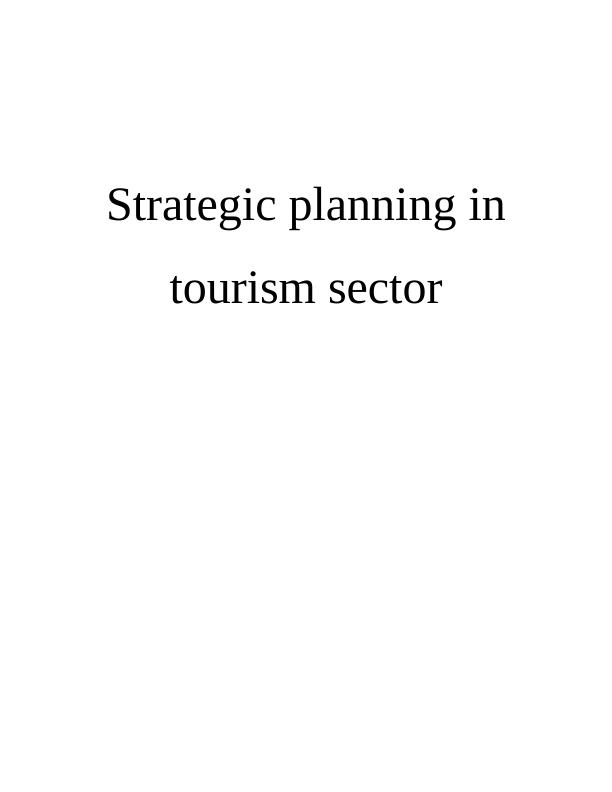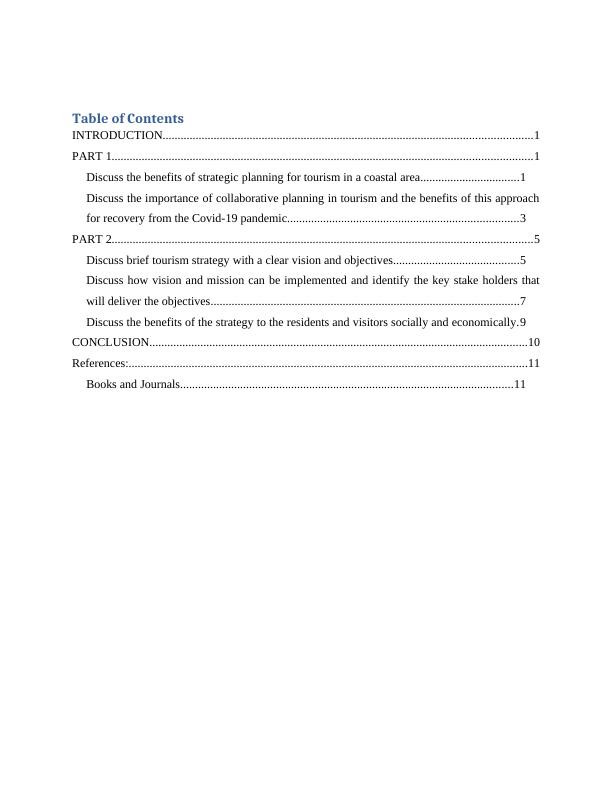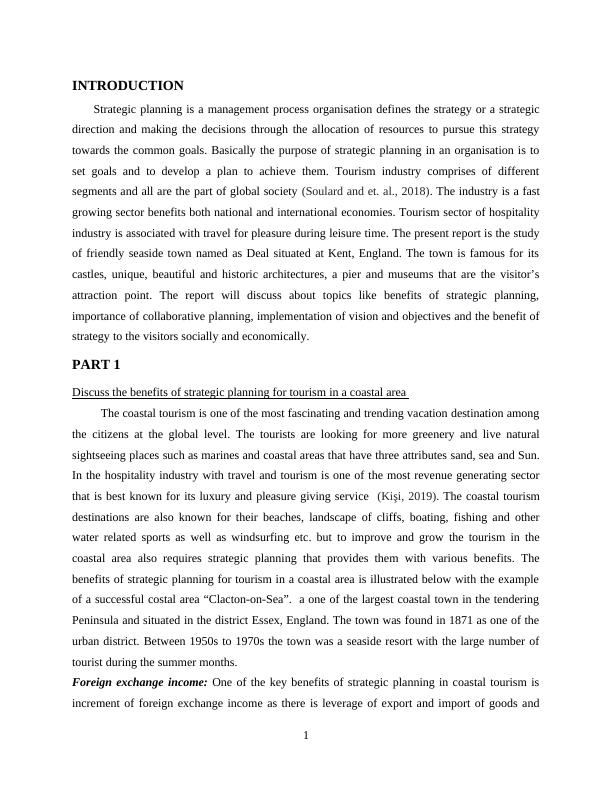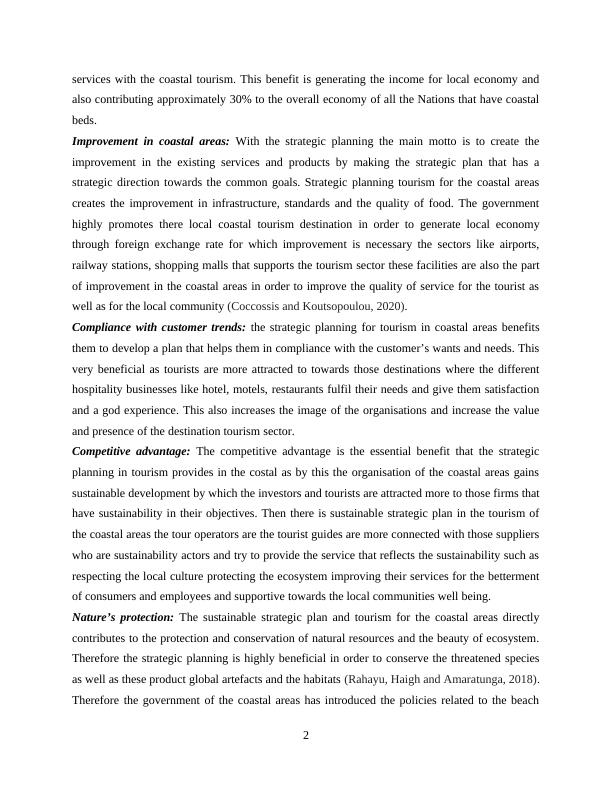Strategic Planning in Tourism Sector
Added on 2022-11-25
14 Pages5177 Words238 Views
Strategic planning in
tourism sector
tourism sector

Table of Contents
INTRODUCTION...........................................................................................................................1
PART 1............................................................................................................................................1
Discuss the benefits of strategic planning for tourism in a coastal area.................................1
Discuss the importance of collaborative planning in tourism and the benefits of this approach
for recovery from the Covid-19 pandemic.............................................................................3
PART 2............................................................................................................................................5
Discuss brief tourism strategy with a clear vision and objectives..........................................5
Discuss how vision and mission can be implemented and identify the key stake holders that
will deliver the objectives.......................................................................................................7
Discuss the benefits of the strategy to the residents and visitors socially and economically.9
CONCLUSION..............................................................................................................................10
References:.....................................................................................................................................11
Books and Journals...............................................................................................................11
INTRODUCTION...........................................................................................................................1
PART 1............................................................................................................................................1
Discuss the benefits of strategic planning for tourism in a coastal area.................................1
Discuss the importance of collaborative planning in tourism and the benefits of this approach
for recovery from the Covid-19 pandemic.............................................................................3
PART 2............................................................................................................................................5
Discuss brief tourism strategy with a clear vision and objectives..........................................5
Discuss how vision and mission can be implemented and identify the key stake holders that
will deliver the objectives.......................................................................................................7
Discuss the benefits of the strategy to the residents and visitors socially and economically.9
CONCLUSION..............................................................................................................................10
References:.....................................................................................................................................11
Books and Journals...............................................................................................................11

INTRODUCTION
Strategic planning is a management process organisation defines the strategy or a strategic
direction and making the decisions through the allocation of resources to pursue this strategy
towards the common goals. Basically the purpose of strategic planning in an organisation is to
set goals and to develop a plan to achieve them. Tourism industry comprises of different
segments and all are the part of global society (Soulard and et. al., 2018). The industry is a fast
growing sector benefits both national and international economies. Tourism sector of hospitality
industry is associated with travel for pleasure during leisure time. The present report is the study
of friendly seaside town named as Deal situated at Kent, England. The town is famous for its
castles, unique, beautiful and historic architectures, a pier and museums that are the visitor’s
attraction point. The report will discuss about topics like benefits of strategic planning,
importance of collaborative planning, implementation of vision and objectives and the benefit of
strategy to the visitors socially and economically.
PART 1
Discuss the benefits of strategic planning for tourism in a coastal area
The coastal tourism is one of the most fascinating and trending vacation destination among
the citizens at the global level. The tourists are looking for more greenery and live natural
sightseeing places such as marines and coastal areas that have three attributes sand, sea and Sun.
In the hospitality industry with travel and tourism is one of the most revenue generating sector
that is best known for its luxury and pleasure giving service (Kişi, 2019). The coastal tourism
destinations are also known for their beaches, landscape of cliffs, boating, fishing and other
water related sports as well as windsurfing etc. but to improve and grow the tourism in the
coastal area also requires strategic planning that provides them with various benefits. The
benefits of strategic planning for tourism in a coastal area is illustrated below with the example
of a successful costal area “Clacton-on-Sea”. a one of the largest coastal town in the tendering
Peninsula and situated in the district Essex, England. The town was found in 1871 as one of the
urban district. Between 1950s to 1970s the town was a seaside resort with the large number of
tourist during the summer months.
Foreign exchange income: One of the key benefits of strategic planning in coastal tourism is
increment of foreign exchange income as there is leverage of export and import of goods and
1
Strategic planning is a management process organisation defines the strategy or a strategic
direction and making the decisions through the allocation of resources to pursue this strategy
towards the common goals. Basically the purpose of strategic planning in an organisation is to
set goals and to develop a plan to achieve them. Tourism industry comprises of different
segments and all are the part of global society (Soulard and et. al., 2018). The industry is a fast
growing sector benefits both national and international economies. Tourism sector of hospitality
industry is associated with travel for pleasure during leisure time. The present report is the study
of friendly seaside town named as Deal situated at Kent, England. The town is famous for its
castles, unique, beautiful and historic architectures, a pier and museums that are the visitor’s
attraction point. The report will discuss about topics like benefits of strategic planning,
importance of collaborative planning, implementation of vision and objectives and the benefit of
strategy to the visitors socially and economically.
PART 1
Discuss the benefits of strategic planning for tourism in a coastal area
The coastal tourism is one of the most fascinating and trending vacation destination among
the citizens at the global level. The tourists are looking for more greenery and live natural
sightseeing places such as marines and coastal areas that have three attributes sand, sea and Sun.
In the hospitality industry with travel and tourism is one of the most revenue generating sector
that is best known for its luxury and pleasure giving service (Kişi, 2019). The coastal tourism
destinations are also known for their beaches, landscape of cliffs, boating, fishing and other
water related sports as well as windsurfing etc. but to improve and grow the tourism in the
coastal area also requires strategic planning that provides them with various benefits. The
benefits of strategic planning for tourism in a coastal area is illustrated below with the example
of a successful costal area “Clacton-on-Sea”. a one of the largest coastal town in the tendering
Peninsula and situated in the district Essex, England. The town was found in 1871 as one of the
urban district. Between 1950s to 1970s the town was a seaside resort with the large number of
tourist during the summer months.
Foreign exchange income: One of the key benefits of strategic planning in coastal tourism is
increment of foreign exchange income as there is leverage of export and import of goods and
1

services with the coastal tourism. This benefit is generating the income for local economy and
also contributing approximately 30% to the overall economy of all the Nations that have coastal
beds.
Improvement in coastal areas: With the strategic planning the main motto is to create the
improvement in the existing services and products by making the strategic plan that has a
strategic direction towards the common goals. Strategic planning tourism for the coastal areas
creates the improvement in infrastructure, standards and the quality of food. The government
highly promotes there local coastal tourism destination in order to generate local economy
through foreign exchange rate for which improvement is necessary the sectors like airports,
railway stations, shopping malls that supports the tourism sector these facilities are also the part
of improvement in the coastal areas in order to improve the quality of service for the tourist as
well as for the local community (Coccossis and Koutsopoulou, 2020).
Compliance with customer trends: the strategic planning for tourism in coastal areas benefits
them to develop a plan that helps them in compliance with the customer’s wants and needs. This
very beneficial as tourists are more attracted to towards those destinations where the different
hospitality businesses like hotel, motels, restaurants fulfil their needs and give them satisfaction
and a god experience. This also increases the image of the organisations and increase the value
and presence of the destination tourism sector.
Competitive advantage: The competitive advantage is the essential benefit that the strategic
planning in tourism provides in the costal as by this the organisation of the coastal areas gains
sustainable development by which the investors and tourists are attracted more to those firms that
have sustainability in their objectives. Then there is sustainable strategic plan in the tourism of
the coastal areas the tour operators are the tourist guides are more connected with those suppliers
who are sustainability actors and try to provide the service that reflects the sustainability such as
respecting the local culture protecting the ecosystem improving their services for the betterment
of consumers and employees and supportive towards the local communities well being.
Nature’s protection: The sustainable strategic plan and tourism for the coastal areas directly
contributes to the protection and conservation of natural resources and the beauty of ecosystem.
Therefore the strategic planning is highly beneficial in order to conserve the threatened species
as well as these product global artefacts and the habitats (Rahayu, Haigh and Amaratunga, 2018).
Therefore the government of the coastal areas has introduced the policies related to the beach
2
also contributing approximately 30% to the overall economy of all the Nations that have coastal
beds.
Improvement in coastal areas: With the strategic planning the main motto is to create the
improvement in the existing services and products by making the strategic plan that has a
strategic direction towards the common goals. Strategic planning tourism for the coastal areas
creates the improvement in infrastructure, standards and the quality of food. The government
highly promotes there local coastal tourism destination in order to generate local economy
through foreign exchange rate for which improvement is necessary the sectors like airports,
railway stations, shopping malls that supports the tourism sector these facilities are also the part
of improvement in the coastal areas in order to improve the quality of service for the tourist as
well as for the local community (Coccossis and Koutsopoulou, 2020).
Compliance with customer trends: the strategic planning for tourism in coastal areas benefits
them to develop a plan that helps them in compliance with the customer’s wants and needs. This
very beneficial as tourists are more attracted to towards those destinations where the different
hospitality businesses like hotel, motels, restaurants fulfil their needs and give them satisfaction
and a god experience. This also increases the image of the organisations and increase the value
and presence of the destination tourism sector.
Competitive advantage: The competitive advantage is the essential benefit that the strategic
planning in tourism provides in the costal as by this the organisation of the coastal areas gains
sustainable development by which the investors and tourists are attracted more to those firms that
have sustainability in their objectives. Then there is sustainable strategic plan in the tourism of
the coastal areas the tour operators are the tourist guides are more connected with those suppliers
who are sustainability actors and try to provide the service that reflects the sustainability such as
respecting the local culture protecting the ecosystem improving their services for the betterment
of consumers and employees and supportive towards the local communities well being.
Nature’s protection: The sustainable strategic plan and tourism for the coastal areas directly
contributes to the protection and conservation of natural resources and the beauty of ecosystem.
Therefore the strategic planning is highly beneficial in order to conserve the threatened species
as well as these product global artefacts and the habitats (Rahayu, Haigh and Amaratunga, 2018).
Therefore the government of the coastal areas has introduced the policies related to the beach
2

End of preview
Want to access all the pages? Upload your documents or become a member.
Related Documents
Importance of Tourism Strategic Plans for Coastal Areaslg...
|16
|4828
|42
Strategic Planning for Tourism in Broadstairs: Benefits, Significance, and Strategieslg...
|16
|5005
|87
Strategic Planning for Tourism and Leisure: Doclg...
|12
|3824
|423
Benefits of Tourism Strategic Plans for Coastal Areaslg...
|16
|4948
|20
Benefits of Tourism Strategic Plans for Coastal Areas and Collaborative Planning in Broadstairslg...
|14
|5082
|57
Strategic Planning for Tourism Development in Deal: Collaborative Planning and Recovery from Covid-19lg...
|13
|5023
|431
